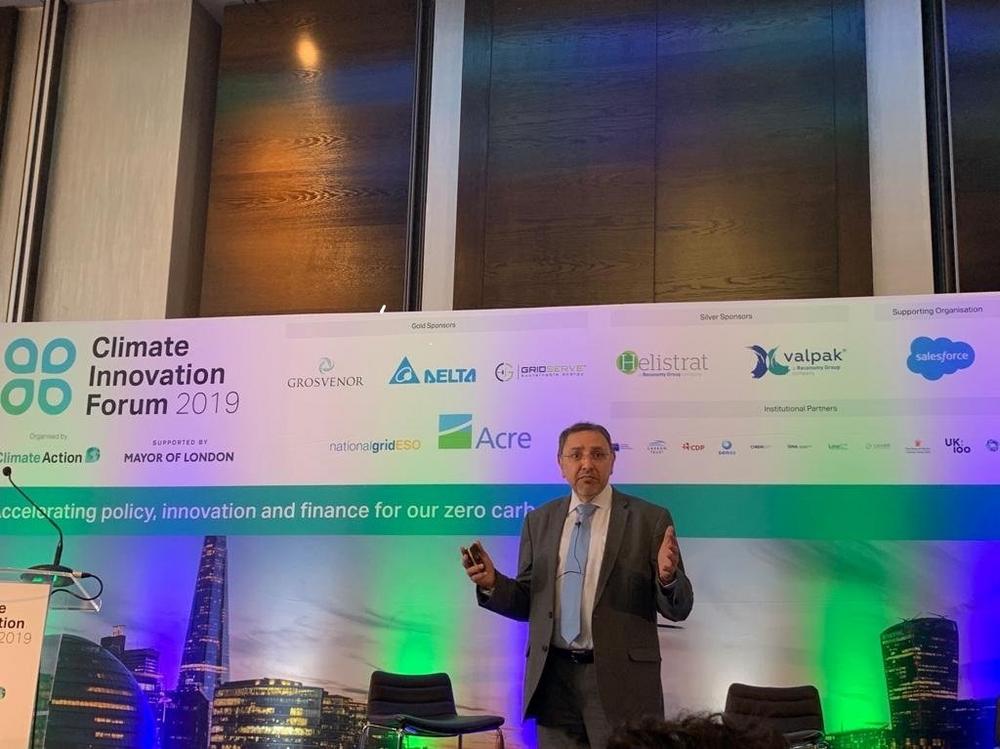As a gold sponsor of the event, Delta Electronics showcased its brand campaign of “IoT-based Smart Green Solutions to Nurture Energy Efficiency in Cities”. It showed the infrastructure of building a smart city, demonstrated the result of how Delta’s 27 green buildings and 1 green datacenter can save up to 90% electricity, and explained how it’s helping the transition to low-carbon transportation. In addition, Rajbir Kambo, sales director, e-Mobility and Smart Energy Solutions from Delta Electronics Europe, Middle East and Africa (EMEA) region, delivered a keynote speech entitled How to Build Smart Charging Infrastructure for Zero Carbon Mobility.
The Infrastructure Impact
The transition is under way. One of the most significant for the UK is the expectation that, by 2040, it could have 36 million electric vehicles and a requirement for four million public charge points. All forms of road transport – personal, public and commercial – will be affected by the move to EVs. City infrastructures will need to adapt to the need for charging points and the consequent change in energy usage. Car parks of all kinds, whether on streets, private premises, shopping malls, offices, leisure facilities or hospitality locations will be expected to provide charging points. Roadside and supermarket service stations will include fastcharging facilities for those in a hurry.
The Issues that Must be Addressed
Everyone who participates in the EV economy needs to do so with relative peace of mind. The energy companies need to be able to balance their supplies effectively as EVs become significant consumers along with homes, buildings, factories and parts of the rail network. The charge point operators need to acquire, store and deliver their electricity profitably and with a high degree of customer satisfaction. They will also want to install electrical equipment as needed and with the minimum impact on their capital expenditure. Fleet owners and individual motorists need to be confident that their vehicles will never be stranded in the middle of nowhere with exhausted batteries.
Open Standards are Key
Bringing all of this together is no mean feat, but we, as an industry owe it to our present and future citizens to deliver them healthy and pollution-free cities.
Delta Electronics has developed a number of specific products, aimed at serving all of the delivery points mentioned, and more besides. Delta works to strict industry standards, such as the Open Charge Point Protocol (OCPP) which enables component vendors and network operators to ‘mix and match’ interoperable electricity supply chain hardware and software, including back-office systems. Any equipment conforming to OCPP can form an integral part of a managed network of devices such as energy storage, charge-points and solar inverters.
Smart Microgrids
An individual charging station could form a microgrid feeding to and drawing from its own energy storage racks. Its software can manage various energy sources – typically grid, photovoltaic and stored energy – and optimise its distribution and consumption. The storage system can recharge itself when grid power is cheapest and, at times of low demand (or peak pricing), could use it as an alternative power source for buildings and other applicaitons. Not forgetting the raison d’être, which is to charge EVs on demand. Delta talks of its fast charging system delivering 100km in 10 minutes.
As The Climate Innovation Forum 2019 set out to prove, transformative changes to how we power our vehicles in the future, will hinge on an eco-system that embraces change for good; the desired – and achievable – result being a cleaner, healthier environment for everyone. Delta is proud to participate in this significant event because its solutions help us move closer to zero carbon buildings and mobility.
Delta, founded in 1971, is a global provider of power and thermal management solutions and a major player in several product segments such as industrial automation, displays, and networking. Its mission statement, "To provide innovative, clean and energy-efficient solutions for a better tomorrow," focuses on addressing key environmental issues such as global climate change. As an energy-saving solutions provider with core competencies in power electronics and innovative research and development, Delta’s business domains include Power Electronics, Automation, and Infrastructure. Delta has 169 sales offices, 70 R&D centers and 38 manufacturing facilities worldwide.
Throughout its history, Delta has received many global awards and recognition for its business achievements, innovative technologies and dedication to corporate social responsibility. Since 2011, Delta has been listed on the DJSI World Index of Dow Jones Sustainability™ Indices for 7 consecutive years. In 2017, Delta was selected by CDP (formerly the Carbon Disclosure Project) for its Climate Change Leadership Level for the 2nd consecutive year.
For detailed information about Delta, please visit: www.deltaww.com
Delta Electronics (Netherlands) B.V.
Zandsteen 15
NL2132MZ Hoofddorp
Telefon: +31 (20) 8003900
Telefax: +31 (20) 8003999
http://www.delta-emea.com/
Mepax
Telefon: +34 (619) 0277-78
E-Mail: m.depablos@mepax.com
![]()
